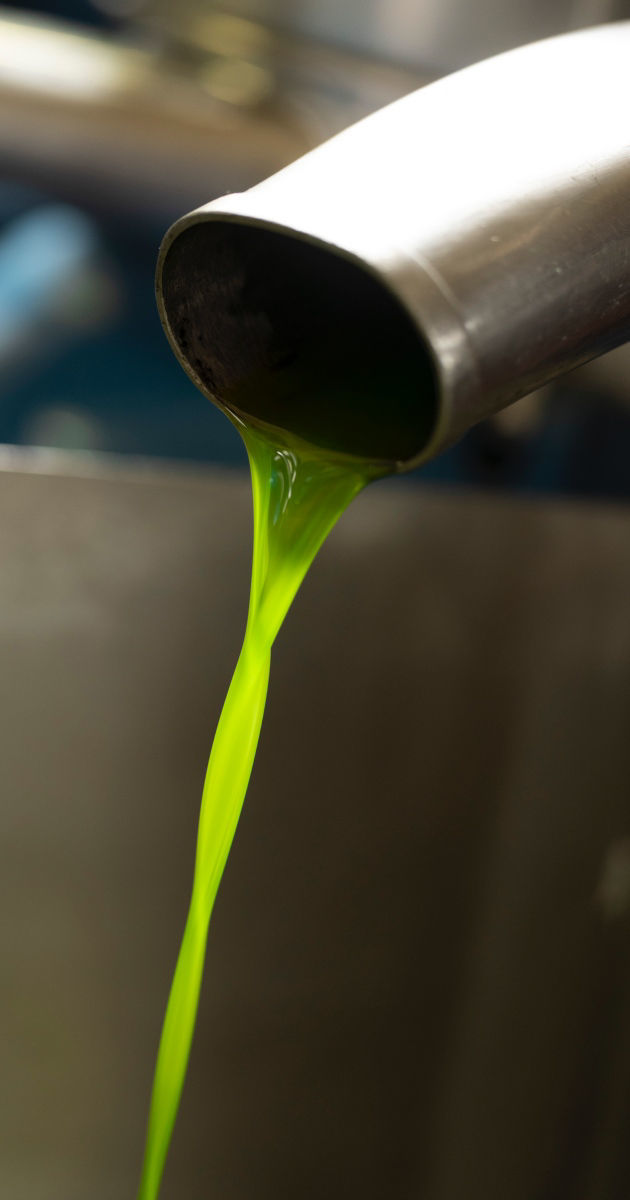
The decantation of oil is a traditional method that can be used during the production of extra virgin olive oil, as an alternative to the more common filtration method.
Once the oil is extracted, these processes aim to remove impurities. The main difference between filtration and decantation is the amount of impurities eliminated, which affects the taste and consumption indications.
Natural decantation requires time and patience, but it is important to ensure at least partial purification of the oil. This process preserves a greater amount of aromatic compounds and naturally occurring polyphenols in the oil, as there are residues of pulp and skin left behind, contributing to the typical flavor and beneficial properties that characterize decanted oil.
In this article, we will explore in detail how to decant olive oil and how decantation works, as well as how naturally it can influence the quality and properties of these types of extra virgin olive oil.
What is the difference between filtered oil and unfiltered oil?
First of all, to better understand the characteristics of decanted oil, it is necessary to understand the difference between filtered and unfiltered oil. The two methods differ in terms of the production process and organoleptic properties of the product.
Filtered extra virgin olive oil undergoes a filtration process, during which solid particles of the oil are removed. This process makes the oil more transparent, free of sediment, and with a more delicate taste compared to unfiltered oil. The only drawback of filtration is the oxidation that occurs when the oil comes into contact with air during the process, which partly reduces the volatile substances that contribute to its aroma and polyphenols. However, this event does not affect the safety of the oil in any way.
On the contrary, unfiltered oil, also called "crude oil," is not subjected to a filtration process. Therefore, it still contains a reduced amount of solid olive particles and may appear cloudier. The presence of fruit particles ensures a strong flavor and aroma in the first weeks after oil production. However, due to its higher impurity content, decanted oil tends to develop sediments, known as "morchia," which ferment with prolonged contact and damage its organoleptic characteristics, resulting in an unpleasant smell and taste. Because of these organic components, decanted oil should be consumed within a few months, or even weeks, to avoid product deterioration. Furthermore, unfiltered oil may contain traces of water and soluble substances, which can affect its quality and stability over a long period of time. For these reasons, decanted oil is often ignored in the preparation of many dishes.
Historically speaking, decantation has been the most used method to produce olive oil. The oil was naturally decanted in large containers where it was left to rest for several weeks or even months. This process always required a lot of patience and attention to prevent the oil from becoming cloudy or rancid. The oil was also stored in terracotta or glass containers to protect it from air and light.
Today, natural decantation is still used by some producers, but it is often replaced by more modern and safe methods that can always guarantee a high level of quality. For example, centrifugation involves the use of specialized machines that use centrifugal force to separate the oil from solid and liquid particles more quickly and efficiently.



What is decanted olive oil and how is it obtained
Decanted oil is a type of extra virgin oil obtained through a natural decantation process. This method involves letting the oil rest in large containers for a period of time that can vary from a few days to several weeks, depending on the amount of oil and the environmental conditions.
During natural decantation, most of the solid particles in the oil, such as impurities and soluble substances, settle at the bottom of the container, while the clearer and more transparent oil accumulates at the top. This process allows for obtaining a variation of extra virgin olive oil, with an intense and characteristic flavor.
Decanted oil maintains its natural organoleptic characteristics, flavor, aroma, and color for the first weeks from production, after which it tends to degrade due to the high content of organic substances.
In conclusion, natural decantation of extra virgin olive oil is not a process that can produce a high-quality oil like the one obtained through the more modern filtration process, even though it can still result in a product with a strong flavor and all its nutritional properties. Filtered oil is more suitable for cooking and preparing delicate dishes, while unfiltered oil is preferred for raw use, such as on salads, bruschetta, or for Tuscan Fettunta. To preserve its qualities and beneficial properties, extra-virgin olive oil should be stored in a cool and dark place, away from light and heat.
It is important to keep in mind the available time to consume the product, as filtered oil can last many months longer than unfiltered oil, which maintains its best quality only for about the first 2 months after production.
In any case, our advice is to always select a high-quality oil, such as Laudemio oil, obtained through careful and controlled filtration processes, guaranteeing maximum safety and taste of the product.
Now that you have learned more about how to decant olive oil in the correct manner, you have one more reason to choose us.